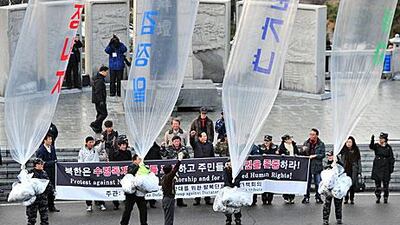SEOUL // With North Korea plunged into mourning following the death of Kim Jong-il, the South Korean government took cautious steps to reach out to its neighbour and prevent uncertainty from spilling over into strife.
In pictures: Kim Jong-il dies
Scenes of mourning across North Korea after the death of the "Dear Leader" is announced.
Hope and fear after N Korea's 'Dear Leader' dies. Read article
N Korean leader mourned in Dubai. Read article
Editorial: The fantasies of the Kim dynasty have a new reality to face. Read article
This continues a pattern that last month saw the government of Lee Myung-bak, the South Korean president, make modest gestures of friendship with Pyongyang, such as sending batches of Hepatitis B vaccines north.
Experts speculated that Mr Lee, with an eye on his legacy as the last full year of his presidency approached, was hoping to organise a summit with Kim Jong-il.
Now, with the North Korean leader dead and his third son, Kim Jong-un, hailed as his successor, Seoul's unification ministry could be testing the waters to determine if the leadership transition offers an opportunity to mend ties on the peninsula, which has been divided for more than five decades.
Yesterday, the ministry announced that civilians or private organisations from the south would be permitted to send messages of condolence to North Korea, a significant gesture for a country that bans praise or sympathy with the Pyongyang regime.
The move came a day after the ministry expressed sympathy for the North Korean people over Kim Jong-il's death.
"It's a kind of olive branch to the north at the moment," said Brian Bridges, an academic and author of two books on Korea, who is based at Lingnan University in Hong Kong.
"At the moment, the south doesn't know what's going on in the North. They are watching and waiting," added Mr Bridges. "They want to see what kind of reaction might emerge from North Korea from this, at least partially, conciliatory gesture."
While the South Korean authorities are not sending a condolence delegation to North Korea, they have said that the widows of the former president, Kim Dae-jung, and the ex-Hyundai Group chairman, Chung Mong-hun, can travel to the north to pay their respects in return for Pyongyang's sending of delegations at the time of each man's death.
Continuing the overtures to Pyongyang, Mr Bridges said Seoul might look to organise a summit with Kim Jong-un, although not before the celebrations in April to mark the 100th anniversary of the birth of Kim Il-sung, North Korea's long-serving first leader.
"It might be something they try for next summer, so something can be done before Lee steps down," he said.
But not everyone in South Korea is looking to mend fences, with a group of North Korean defectors gathering yesterday near the border to launch balloons said to contain thousands of leaflets denouncing the handing of the North Korean leadership to Kim Jong-un.
Yet with Pyongyang appearing stable, South Korean stocks and the currency, the won, rose yesterday.
This follows falls amid uncertainty after Monday's announcement that Mr Kim had died on Saturday.
Similarly, there was little sign of anxiety on the streets of Seoul yesterday, with commuters in the bustling city of 10.4 million, which lies 50 kilometres south of the border with North Korea, going about their business as normal.
"Most Koreans don't worry about safety. They are worried about the American exchange markets and the European markets," said Noh Sung-wo, 46, a manager in the car industry.
So-rim Lee, 29, a doctoral student who recently returned to South Korea after six years in the US and UK, said the leadership change was less of a cause for worry than that in 1994, when Kim Il-sung died. "I don't think there's going to be that horror or terror regarding communism like people talked about in the 1990s," she said.
Amid speculation over how the new North Korean leadership might act with respect to its southern neighbour, Paik Hak-soon, a senior fellow at the Seoul think tank, the Sejong Institute, said South Korea's moves towards rapprochement would remain "cautious".
"They're using this opportunity but not that aggressively," he said.


